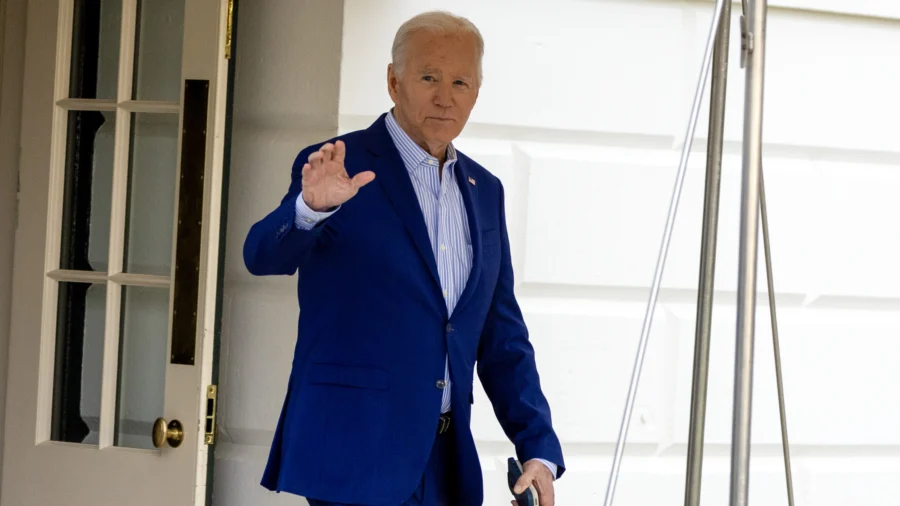WASHINGTON—The next call between U.S. President Joe Biden and the Chinese Communist Party (CCP) General Secretary Xi Jinping is likely to occur in the spring, according to a U.S. senior administration official. She didn’t disclose a specific date at the press call on Jan. 27.
She added that the United States and China would launch a working group on counternarcotics on Jan. 30. In addition, military maritime consultative agreement meetings will also occur at the minister-secretary level this spring, followed by military talks between theater commanders and at minister-secretary levels.
Beijing re-opened its recurring cabinet-level communications with Washington when Mr. Biden and Xi met at the Woodside Summit in California last November. The two leaders agreed on resuming military-to-military communication and collaborating on curbing fentanyl flow into the United States as well as addressing artificial intelligence-related risks.
The official stressed that Biden–Xi calls are “absolutely critical to maintaining direction in the relationship and following up on some of the issues from Woodside.”
The schedules of the next U.S.–China high-level meetings were discussed at the two-day meetings between U.S. national security adviser Jake Sullivan and China’s Foreign Minister Wang Yi in Bangkok on Jan. 26 and 27.
Regarding Taiwan, the official said that Mr. Sullivan reiterated to Mr. Wang the U.S. position of “opposing unilateral changes to the status quo” from either Taiwan or Beijing.
Next week, the United States and China will hold formal high-level counternarcotics talks in Beijing, Chinese officials told NBC.
Unclear Whether China Has Pressed Iran on Ending Red Sea Crisis
The White House is unclear about whether China has pressed Iran to end the Red Sea crisis, according to the senior official at the press call.
The Houthis, an Iran-backed militant group in Yemen, have attacked over two dozen cargo ships with drones, missiles, and speedboats in the Red Sea since mid-November. Since then, many ships have had to add two weeks into their shipping route by going around the Cape of Good Hope in South Africa instead of going through the Suez Canal via the Red Sea.
“There should be a clear interest in China in terms of quieting some of those attacks,” the official said, adding that Houthi’s destabilization of global shipping shouldn’t be just a concern for the United States and China. However, she added it remains to be seen if China would choose to yield its influence on Iran to address the issue.
She said that Mr. Sullivan “raised the importance of Beijing using its substantial leverage with Iran to call for an end and bringing an end to these dangerous tasks.”
“It’s not the first time we’ve called on China to play a constructive role. Beijing says they are raising this with the Iranians,” she added.
“But we’re certainly going to wait to see before we comment further on how effectively or whether we think they’re actually raising it.”
In terms of China playing a positive role in mitigating the Red Sea crisis, she said: “The Chinese are telling us directly that they’re raising it with Iran. But I think we’re looking to actual facts on the ground, and those attacks seem to be continuing.”
The current Red Sea crisis is a spin-off of the Israel–Hamas war on international water, with the potential of spiraling into a proxy war between the United States and Iran.
The Houthi attacks have brought about significant disruption to international commercial shipping. The Suez Canal, which is a choke point between the Red Sea and the Mediterranean Sea and a key path for goods to reach Europe, makes up about 11 percent of global maritime trade.
As of mid-January, the transit volume through the Suez Canal was down by about 37 percent, and the volumes around the Cape of Good Hope have increased by about 54 percent, according to the International Monetary Fund.
The White House has said that the Houthis are receiving operational and material support from Iran and have used Iranian drones and missiles to launch more than 100 attacks on ships in the Red Sea.
In response, the United States formed an international coalition and has conducted air and missile strikes against Houthi-held territory in Yemen since Jan. 11.
Jan. 22 marked the latest joint attacks on Houthis by the U.S.-led coalition, targeting an underground storage site and missile and air surveillance capabilities.
After the strikes, Pentagon spokesperson Maj. Gen. Pat Ryder told the press: “We are not at war in the Middle East.” “Our aim remains to de-escalate tensions and restore stability in the Red Sea.”
The Biden administration moved to re-designate the Houthis as a terror group earlier in the month due to the group’s continued attacks on civilians. A senior administration official said during a Jan. 16 press call that the “impactful designation” was necessary given the scope of the Houthis’ behavior.
A spokesperson for Iran’s foreign ministry has denied involvement in the attacks, saying that the Houthis act “independently and spontaneously based on their interests and that of their people.”
Andrew Thornebrooke contributed to this article.
From The Epoch Times

